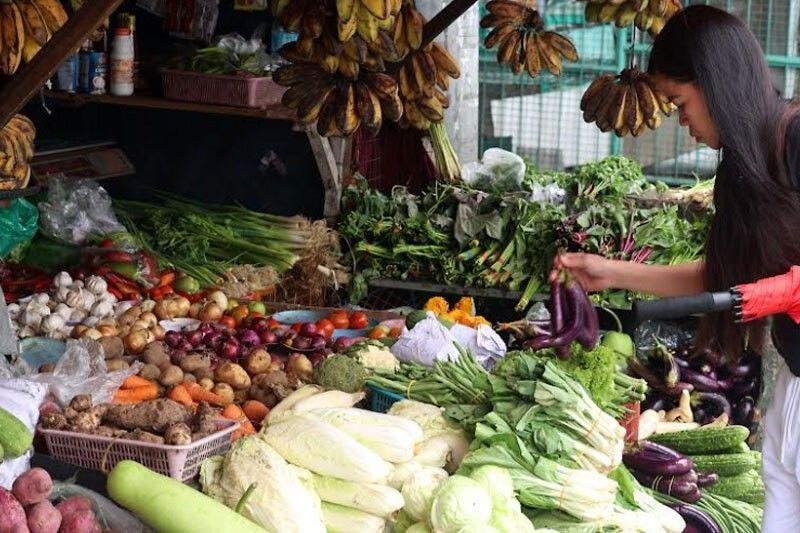Taming inflation, food security still Marcos priorities

MANILA, Philippines — Taming inflation, particularly rising rice prices, and ensuring food security remain top priorities of the government, President Marcos reiterated in his third State of the Nation Address (SONA) yesterday.
The issue of rice prices and food security was the first thing Marcos tackled in his SONA, where he said the recent data bannering the country as among the best-performing in Asia means nothing to a Filipino, who is confronted by the price of rice at P45 to P65 per kilo. Rice was also mentioned towards the end of his speech.
“My dear countrymen, I know you are feeling it (inflation). We do not ignore your grievances and sufferings,” the President said in his speech delivered at the Batasang Pambansa.
Inflation slowed down to 3.7 percent in June from 3.9 percent in May due to the easing of energy and transport costs, according to the Philippine Statistics Authority (PSA).
Controlling the increase in prices of basic commodities remains the top concern of most Filipinos, a recent poll conducted by OCTA Research showed.
Marcos’ campaign promise is to bring down the price of rice to P20 a kilo.
Marcos said while the Philippines harvested a record of 20 million tons of palay last year, it fell short to fill the 16 million tons of rice requirement of the country.
“So we continue to support the agricultural sector, to speed up, facilitate and boost production – from planting, harvesting, to transportation and sale – to also prevent product spoilage,” the President said.
In the past year, more than 100 million kilos of various seeds, seedlings and fertilizers were distributed to farmers.
In terms of fisheries, the government released more than 500 million fingerlings and 3,000 fishing boats, the President said. It also rehabilitated fish ports to support the industry, he added.
The government also extended technical and financial assistance to help players in the agriculture sector gain new knowledge in production and sourcing of capital.
Marcos said the government is also ready to provide livestock raisers with African swine fever vaccine to protect farmers and raisers from future losses.
Because of compelling emergency reasons, such as illegal price manipulations by hoarders, the government was constrained to temporarily implement mandated price ceilings on rice, the President said.
He said the government also extended the reduced tariff rates to facilitate the importation of rice, corn and pork until the end of this year.
Also part of government’s thrust to ensure food security is giving land to the landless, Marcos said.
In the last two years, more than 130,000 land titles were handed over to agrarian reform beneficiaries, he said.
The government also modernized customs procedures and heightened enforcement efforts, resulting to the seizure of more than P2.7-billion smuggled agri-fisheries products that could have entered the market and negatively influenced prices.
The government will also implement soon the pre-border technical verification and cross-border electronic invoicing of import commodities to send a strong signal that the government means serious business, Marcos said.
To reduce unnecessary business costs, he said local government units no longer collect fees and charges from motorists transporting goods and merchandise while passing through national roads.
Marcos also urged LGUs to refrain from collecting similar fees for the use of local roads.
Government salary hike
Marcos announced a new pay hike and additional medical benefits for government employees during his SONA.
“For our government workers, they can expect a medical allowance as an additional benefit next year,” Marcos said.
“Not only that. A salary hike is in the works and they can get it in four tranches. We have allocated funds for this starting this year and for the succeeding years,” he added.
Marcos did not elaborate on the medical allowance. The government last implemented an upward adjustment in the salaries of its workers this year, the last tranche of the Salary Standardization Law that began in 2020.
Earlier this month, the budget department said P70 billion has been allocated for the pay hike of government workers in the proposed national budget for next year. The salary hike requires the approval of Congress.
Marcos also mentioned the extension of the services of job order and contract of service personnel working in government in his address.
“This will also afford them ample opportunity to work on their civil service eligibilities, while gaining additional relevant experience and training to upgrade their employment qualifications,” he said.
The President reported that minimum wage levels have been increased in various sectors in all regions for private sector workers. The pay increase would provide relief to more than four million Filipinos and their families, he added.
‘Poverty rate down’
The percentage of Filipinos considered poor declined in 2023, returning to its pre-pandemic level.
Preliminary data released yesterday by the PSA showed the country’s poverty incidence was at 15.5 percent last year, lower than the 18.1 percent poverty incidence in 2021.
The government’s poverty incidence target for 2023 under the Philippine Development Plan (PDP) was 16 percent to 16.4 percent. Poverty rate in 2018, or before the pandemic, was 16.7.
In terms of magnitude, there were 17.54 million Filipinos considered poor last year, down from 19.99 million in 2021.
Poverty incidence, based on the preliminary results of the Family Income and Expenditure Survey, is the proportion of individuals without enough income to buy the minimum basic food and non-food items.
Among families, poverty incidence also slid to 10.9 percent in 2023 from 13.2 percent in 2021.
This translates to a decrease in the number of impoverished families to three million in 2023 from 3.50 million in 2021.
PSA data also showed the subsistence incidence or the proportion of Filipinos whose incomes were insufficient to meet their basic food needs falling to 4.3 percent in 2023 from 5.9 percent in 2021.
This is equivalent to around 4.84 million Filipinos living below the food thresholds in 2023, lower than the 6.55 million in 2021.
Average per capita income increased by 17.9 percent between 2021 and 2023, outpacing the 15.3 percent rise in the annual per capita poverty threshold during the same period.
“The decline in poverty could have been sharper had inflation been more moderate,” National Economic and Development Authority Secretary Arsenio Balisacan said.
Inflation in the first half of 2023 averaged 7.2 percent, above the central bank’s two to four percent target band. — Alexis Romero, Louella Desiderio
- Latest
- Trending
































